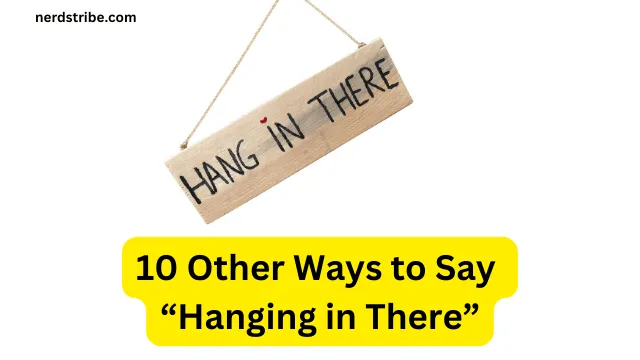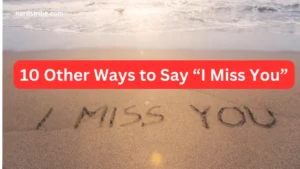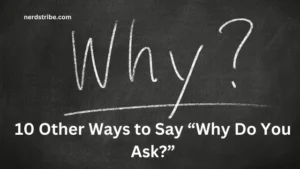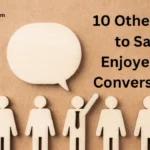Life often feels like a rollercoaster—sometimes exhilarating, other times overwhelming. When someone asks, “How are you doing?” and you’re navigating a tough phase, responding with “hanging in there” is common.
It’s a phrase that conveys resilience but can sound overused or repetitive. Wouldn’t it be nice to express yourself in fresh, relatable ways that truly capture your experience?
Language has the power to transform how we communicate our feelings. By expanding your vocabulary, you not only keep conversations engaging but also allow yourself to be more expressive. Whether you’re dealing with stress, celebrating small victories, or offering support, finding the right words can make all the difference.
In this blog, we’ll explore 10 creative alternatives to “hanging in there.” These expressions will help you convey your emotions more effectively, whether you’re sharing your struggles, showing empathy, or simply responding with a bit of humor or creativity.

Contents
- 1 1. “Taking It One Day at a Time”
- 2 2. “Surviving, Not Thriving”
- 3 3. “Managing, Thanks for Asking”
- 4 4. “Still Standing”
- 5 5. “Making Progress, Slowly but Surely”
- 6 6. “Keeping My Head Above Water”
- 7 7. “Holding On”
- 8 8. “In the Trenches”
- 9 9. “Fighting the Good Fight”
- 10 10. “Rolling with the Punches”
- 11 Conclusion
- 12 FAQs
- 12.1 Why should I use alternatives to “hanging in there”?
- 12.2 Which phrase is best for professional settings?
- 12.3 Can I use these phrases in casual conversations?
- 12.4 Are these alternatives culturally specific?
- 12.5 How do I choose the right phrase?
- 12.6 Can these alternatives help with written communication?
1. “Taking It One Day at a Time”
This phrase emphasizes patience and persistence during tough times.
- Key Meaning: Suggests a focus on small, manageable steps.
- Usage: Perfect when discussing long-term challenges or ongoing recovery.
- Example: “I’m taking it one day at a time, but I’m getting through.”
- Why It’s Effective: It conveys resilience and hope without overwhelming details.
2. “Surviving, Not Thriving”
A lighthearted yet honest response for challenging days.
- Key Meaning: Acknowledges struggles with a touch of humor.
- Usage: Great for casual or humorous conversations with friends.
- Example: “I’m surviving, not thriving—but hey, I’m here!”
- Why It’s Effective: It’s relatable and adds levity to tough situations.
3. “Managing, Thanks for Asking”
A polite and composed way to express perseverance.
- Key Meaning: Indicates you’re coping, even if things aren’t perfect.
- Usage: Ideal for professional or polite exchanges.
- Example: “I’m managing, thanks for asking. How about you?”
- Why It’s Effective: It’s balanced and respectful in tone.
4. “Still Standing”
A powerful phrase that highlights resilience and determination.
- Key Meaning: You’re enduring challenges without giving up.
- Usage: Works well when you want to convey strength.
- Example: “It’s been tough, but I’m still standing.”
- Why It’s Effective: It’s short, impactful, and uplifting.
5. “Making Progress, Slowly but Surely”
Focuses on positive momentum, even if it’s gradual.
- Key Meaning: Suggests steady improvement and optimism.
- Usage: Use this when discussing personal growth or healing.
- Example: “I’m making progress, slowly but surely.”
- Why It’s Effective: It highlights perseverance and a hopeful outlook.

6. “Keeping My Head Above Water”
A vivid metaphor for staying afloat during challenging times.
- Key Meaning: Suggests you’re doing your best to avoid being overwhelmed.
- Usage: Ideal for describing high-stress periods.
- Example: “Work is crazy, but I’m keeping my head above water.”
- Why It’s Effective: It’s relatable and visually expressive.
7. “Holding On”
A simple yet poignant way to express determination.
- Key Meaning: Indicates you’re enduring difficulties without giving up.
- Usage: Suitable for personal or emotional conversations.
- Example: “I’m holding on, one step at a time.”
- Why It’s Effective: It’s concise and emotionally resonant.
8. “In the Trenches”
A phrase that conveys being actively involved in a tough situation.
- Key Meaning: Highlights effort and persistence during struggles.
- Usage: Common in discussions about demanding work or personal projects.
- Example: “I’m in the trenches, but I’ll get through it.”
- Why It’s Effective: It paints a vivid picture of hard work and resilience.
9. “Fighting the Good Fight”
Conveys determination to overcome obstacles with purpose.
- Key Meaning: Suggests you’re committed to staying strong despite challenges.
- Usage: Great for discussing causes or long-term struggles.
- Example: “I’m fighting the good fight every day.”
- Why It’s Effective: It’s motivational and emphasizes inner strength.
10. “Rolling with the Punches”
A casual way to express adaptability and resilience.
- Key Meaning: Suggests flexibility in the face of unexpected challenges.
- Usage: Works well in casual or lighthearted conversations.
- Example: “Life’s unpredictable, but I’m rolling with the punches.”
- Why It’s Effective: It’s relatable and highlights adaptability.
Conclusion
The phrase “hanging in there” has served us well, but sometimes, finding alternative expressions can bring clarity, depth, or even humor to your responses. Each of the options we explored adds a unique tone and perspective, helping you connect with others while staying true to your emotions.
Whether you choose to say “taking it one day at a time” to express patience or “rolling with the punches” to highlight your adaptability, these alternatives allow for more meaningful communication. Language is a powerful tool for sharing our experiences, and small changes can make a big difference.
So next time someone asks how you’re doing, try one of these phrases. It’s not just about the words—it’s about expressing yourself in a way that feels authentic and engaging.
FAQs
Why should I use alternatives to “hanging in there”?
Alternatives provide variety, help express yourself more accurately, and keep conversations engaging.
Which phrase is best for professional settings?
“Managing, thanks for asking” or “Making progress, slowly but surely” work well in professional environments.
Can I use these phrases in casual conversations?
Absolutely! Options like “Rolling with the punches” or “Surviving, not thriving” are perfect for casual chats.
Are these alternatives culturally specific?
Most are universally understood, though phrases like “In the trenches” might be more familiar in certain contexts.
How do I choose the right phrase?
Consider the context, your audience, and the emotions you want to convey when selecting a phrase.
Can these alternatives help with written communication?
Yes, they can make emails, messages, or social media posts more dynamic and expressive.








